| Title | Size | Downloads |
|---|---|---|
WA7500-CMW710-E2611P05__Release_Notes.pdf  |
863.31 KB | |
WA7500-CMW710-E2611P05_Release_Notes_(Software_Feature_Changes).pdf  |
1.23 MB | |
WA7500-CMW710-E2611P05.zip  |
63.92 MB |
|
WA7500-CMW710-E2611P05 Release Notes |
|
|
Copyright © 2024 New H3C Technologies Co., Ltd. All rights reserved. No part of this manual may be reproduced or transmitted in any form or by any means without prior written consent of New H3C Technologies Co., Ltd. The information in this document is subject to change without notice. |
|
Contents
Hardware and software compatibility matrix· 1
Upgrading restrictions and guidelines· 2
Software feature and command updates· 3
Open problems and workarounds· 3
Resolved problems in WA7500-CMW710-E2611P05· 3
Resolved problems in WA7500-CMW710-E2610P01· 5
Resolved problems in WA7500-CMW710-E2605P50· 7
Resolved problems in WA7500-CMW710-E2605P01· 8
Resolved problems in WA7500-CMW710-E2605· 8
Resolved problems in WA7500-CMW710-E2598P08· 9
Resolved problems in WA7500-CMW710-E2598P07· 10
Resolved problems in WA7500-CMW710-E2598P04· 10
Resolved problems in WA7500-CMW710-E2598P01· 11
Appendix B Upgrading software· 13
Upgrading through the associated AC· 13
Upgrading from the Cloudnet 16
Upgrading specific devices· 16
Upgrading devices of specific models· 17
Upgrading from the Web interface· 18
Upgrading from the Web interface· 18
Saving the running configuration and verifying the storage space· 22
Downloading the image file to the AP· 23
Specifying the startup image file· 24
Rebooting the AP to complete the upgrade· 24
Upgrading from the BootWare menu· 25
Upgrading from the BootWare menu· 26
Using Xmodem to upgrade the BootWare through the console port 31
Appendix C Converting the AP mode· 33
Converting the AP mode from the BootWare menu· 34
This document describes the features, restrictions and guidelines, open problems, and workarounds of WA7500 APs. Before you use this version in a live network, back up the configuration and test the version to avoid software upgrade affecting your live network.
Use this document in conjunction with the documents listed in “Related documentation”.
Version information
Version number
Comware Software, Version 7.1.064, ESS 2611P05
Note: This version number can be displayed by using the command display version in any view. Please see Note1.
Version history
Version number | Last version | Release date | Release type | Remarks |
WA7500-CMW710-E2611P05 | WA7500-CMW710-E2610P01 | 2024-11-30 | ESS version | None |
WA7500-CMW710-E2610P01 | WA7500-CMW710-E2605P50 | 2024-09-19 | ESS version | None |
WA7500-CMW710-E2605P50 | WA7500-CMW710-E2605SP01 | 2024-07-25 | ESS version | None |
WA7500-CMW710-E2605P01 | WA7500-CMW710-E2605 | 2024-04-27 | ESS version | None |
WA7500-CMW710-E2605 | WA7500-CMW710-E2598P08 | 2024-04-03 | ESS version | None |
WA7500-CMW710-E2598P08 | WA7500-CMW710-E2598P07 | 2024-01-30 | ESS version | None |
WA7500-CMW710-E2598P07 | WA7500-CMW710-E2598P04 | 2023-12-17 | ESS version | None |
WA7500-CMW710-E2598P04 | WA7500-CMW710-E2598P01 | 2023-11-16 | ESS version | None |
WA7500-CMW710-E2598P01 | First release | 2023-09-26 | Official version | Released a version that supports all the two AP modes (fit and cloud) for the first time |
Hardware and software compatibility matrix
| CAUTION: To avoid an upgrade failure, use Table 2 to verify the hardware and software compatibility before performing an upgrade. |
Table 2 Hardware and software compatibility matrix
Item | Specifications |
Product family | WA7538/WA7539/WA7539-JP |
Memory | WA7538/WA7539/WA7539-JP: 2048M |
Flash | WA7538/WA7539/WA7539-JP: 256M NAND |
Boot ROM version | Basic:7.04 Extern:7.04 (Note: Perform the command display version command in any view to view the version information. Please see Note2.) |
Software images and their MD5 checksums | WA7500-CMW710-E2611P05.ipe MD5: 9b1e1227e6ff61927f132556fccd832c |
iMC | iMC WSM 7.3 (E0614P03) |
iNode | iNode PC 7.3(E0585) |
To display the software and Boot ROM version of the WA7500, perform the following:
H3C Comware Software, Version 7.1.064, ESS 2611P05 --------Note1
Copyright (c) 2004-2024 New H3C Technologies Co., Ltd. All rights reserved.
H3C WA7538 uptime is 0 weeks, 0 days, 0 hours, 1 minute
Last reboot reason : Power on
Boot image: flash:/wa7500-boot.bin
Boot image version: 7.1.064, ESS 2611P05 --------Note1
System image: flash:/wa7500-system.bin
System image version: 7.1.064, ESS 2611P05 --------Note1
Compiled Nov 19 2024 16:00:00
with 1 ARM 2600MHz Processor
2048M bytes DDR4
256M bytes NandFlash Memory
Current running mode: Cloud AP
Next startup mode: Cloud AP
Hardware Version is Ver.A
Basic Bootrom Version is 7.04 --------Note2
Extend Bootrom Version is 7.04 --------Note2
[Subslot 0]H3C WA7500 Hardware Version is Ver.A
[SLOT 1]GE1/0/1 (Hardware)Ver.A, (Driver)1.0
[SLOT 1]XGE1/0/1 (Hardware)Ver.A, (Driver)1.0
[SLOT 1]XGE1/0/2 (Hardware)Ver.A, (Driver)1.0
[SLOT 1]RADIO1/0/1 (Hardware)Ver.A, (Driver)1.0
[SLOT 1]RADIO1/0/2 (Hardware)Ver.A, (Driver)1.0
[SLOT 1]RADIO1/0/3 (Hardware)Ver.A, (Driver)1.0
Upgrading restrictions and guidelines
Hardware feature updates
Software feature and command updates
For the fit AP mode, see the AC release notes. For the cloud or anchor AC mode, see the AP release notes.
MIB updates
None.
Operation changes
Restrictions and cautions
Restrictions
Open problems and workarounds
None.
List of resolved problems
Resolved problems in WA7500-CMW710-E2611P05
202410111849
· Symptom: The bandwidth configuration does not take effect if you configure channel 30 and a bandwidth of 160M for the AP during radar quite period and then restart the AP.
· Condition: This symptom might occur if you configure channel 30 and the 160M bandwidth for the AP during radar quite period and then restart the AP.
202410161225
· Symptom: Added the remark local-precedence feature for QoS policy behavior.
· Condition: None.
202410161227
· Symptom: Storm suppression does not take effect if you configure the percentage first and then configure PPS.
· Condition: This symptom might occur if you configure the percentage first and then configure PPS for storm suppression.
202410161315
· Symptom: The client rate limit configuration cannot be deployed and cannot take effect if you configure client rate limit first and then restart the AP.
· Condition: This symptom might occur if you configure client rate limit first and then restart the AP.
202410210308
· Symptom: Online clients cannot ping other devices after you enable intelligent bandwidth guarantee and client-based rate limit.
· Condition: T This symptom might occur after you enable intelligent bandwidth guarantee and client-based rate limit.
202410250449(PNR52827)
· Symptom: An AP still sends control packets after you specify a radar channel for the AP.
· Condition: This symptom might occur after you specify a radar channel for an AP.
202411011084
· Symptom: After you set the 320M bandwidth, the primary channel setting is incorrect, causing inconsistent AC and AP status. The AP restarts unexpectedly.
· Condition: This symptom might occur if you set the 320M bandwidth.
202411090004
· Symptom: After you change the region code of an AP, the bandwidth of channels 132 through 144 changes to 160 Mhz.
· Condition: This symptom might occur on channels 132 through 144 after you change the region code.
202411160488
· Symptom: When the channel of a 2.4 GHz radio changes, the system prompts "Radar channel recover."
· Condition: None.
202411202208
· Symptom: Optimized and improved the mesh link performance.
· Condition: None.
202411202210
· Symptom: Optimized intelligent O&M statistics.
· Condition: None.
202411202211
· Symptom: A fit AP cannot come online from the AC.
· Condition: This symptom might occur after you manually trigger a fit AP reset.
202411251759
· Symptom: Mesh links become unavailable.
· Condition: This symptom might occur if you change mesh profiles repeatedly, which causes link flapping.
202411261540
· Symptom: The AP restarts unexpectedly.
· Condition: This symptom might occur after you repeatedly shut down and bring up the mesh link on an AP when keepalive is enabled.
202411270200
· Symptom: Radio 1 and radio 2 fail to start up if the cloud-managed AP starts up with configurations.
· Condition: This symptom might occur if a cloud-managed AP starts up with configurations.
202411270529
· Symptom: Cloud-managed APs cannot establish mesh links using the default channel after the APs restart.
· Condition: This symptom might occur if cloud-managed APs using the default channel to establish mesh links restart.
202411281465
· Symptom: The client performance degrades after UCC and SQA are enabled.
· Condition: This symptom might occur after you enable UCC and SQA.
Resolved problems in WA7500-CMW710-E2610P01
202112140687
· Symptom: Configuration alarms are mistakenly triggered during client association and disassociation.
· Condition: This symptom might occur if the device operates in cloud or anchor AC mode and SNMP is configured.
202308281422
· Symptom: Added support for the domain name and address binding function.
· Condition: none.
202309170033
· Symptom: The navigation function is abnormal after you enable and disable a radio.
· Condition: none.
202402190953
· Symptom: Added support for the remote configuration function.
· Condition: none.
202403190398
· Symptom: In cloud mode, the preamble puncturing configuration fails for 2.4GHz radios.
· Condition: This symptom might occur if you configure preamble puncturing for 2.4GHz radios in cloud mode.
202404080402(FPR2693)
· Symptom: The device restarts due to radio MAC freezing in the scanning scenario.
· Condition: None.
202404121557(FPR2679)
· Symptom: 802.11ax clients cannot communicate with others after coming online..
· Condition: None.
202404190345
· Symptom: APs cannot come online on the AC through an encrypted CAPWAP tunnel.
· Condition: This symptom might occur when tunnel encryption is enabled for APs to come online on the AC through an encrypted CAPWAP tunnel.
202406131240
· Symptom: The calibrate-bandwidth mode periodic configuration under AP radio 1 gets lost after the AC restarts.
· Condition: This symptom might occur on the WA7539 AP after the AC restarts.
202406202026
· Symptom: When the region code is set to JP in AP view on the Web interface, the radio configuration page cannot obtain the correct device bandwidth or channel.
· Condition: This symptom might occur when the region code is set to JP in AP view on the Web interface.
202406251497
· Symptom: After you configure DNS snooping, the system prompts that the operation fails.
· Condition: This symptom might occur after you configure DNS snooping.
202407021613
· Symptom: Ethernet port rate limiting does not take effect.
· Condition: None.
202408051496
· Symptom: Optimized wireless performance.
· Condition: None.
202408051500
· Symptom: The low rate blocking feature does not take effect.
· Condition: This symptom might occur after a specific operation is performed.
202408071231
· Symptom: The AP restarts unexpectedly.
· Condition: This symptom might occur when you view load balancing neighbor information in a specific mode.
202408090007
· Symptom: Added support for the mesh feature.
· Condition: None.
202409051781
· Symptom: Client APs cannot obtain IP addresses.
· Condition: This symptom might occur if you bind a common encrypted wireless service to a radio, unbind the service, and then configure client APs to come online.
202409100390
· Symptom: System errors occur during the AP association process, causing the AP to restart before coming online..
· Condition: This symptom might occur when an AP attempts to come online from an AC..
202409230260
· Symptom: APs restart unexpectedly.
· Condition: This symptom might occur if multiple clients come online and go offline repeatedly.
202409230261
· Symptom: APs restart unexpectedly.
· Condition: This symptom might occur if multiple clients come online and go offline repeatedly.
202409230265
· Symptom: APs restart unexpectedly.
· Condition: TThis symptom might occur if multiple clients come online and go offline repeatedly.
202409240929
· Symptom: APs restart unexpectedly.
· Condition: This symptom might occur if multiple clients come online and go offline repeatedly.
202409250654
· Symptom: Packets with unknown source MAC addresses cannot be forwarded when the number of MAC address entries reaches 1536.
· Condition: This symptom might occur when the number of MAC address entries learned by the uplink port (PoE port) of the AP reaches 1536.
Resolved problems in WA7500-CMW710-E2605P50
202407151583
· Symptom: The transmit power is inaccurate after you switch the MIMO mode when an overseas region code is used.
· Condition: This symptom might occur after you switch the MIMO mode when an overseas region code is used.
202407151584
· Symptom: Added the Chile region code, updated the 6G band for the Philippines region
code, enabled the 320M for the WA7539-JP, and modified Singapore band adjustments
to be aligned with the regulations.
· Condition: None.
202407221811
· Symptom: The AMDPU aggregation quantity is low, resulting in limited maximum
performance.
· Condition: None.
202407241652
· Symptom: The low-rate disabling function does not take effect.
· Condition: This symptom might occur if you disables low rates for APs and then bind a
service template.
Resolved problems in WA7500-CMW710-E2605P01
202404191354
· Symptom: The Web interface cannot display PMF related configurations correctly under certain circumstances.
· Condition: None.
202404220349
· Symptom: The device in cloud mode restarts after you disable the 6G service.
· Condition: None.
Resolved problems in WA7500-CMW710-E2605
202309050240(PNR41353)
· Symptom: The destination host for SNMP alarm messages cannot be set through MIB.
· Condition: None.
202309170033
· Symptom: After you configure the roaming navigation parameters, changing the radio status causes the roaming navigation parameters to become ineffective.
· Condition: This symptom might occur if you switch the radio state after configuring roaming navigation parameters.
202311080530
· Symptom: Adding an AP to a group causes the system to restart unexpectedly.
· Condition: None.
202401051250
· Symptom: Resolved the issue where the AP restarts unexpectedly.
· Condition: This symptom might occur if you configure a service template, perform shutdown, save the configuration, and then perform undo shutdown.
202401220226
· Symptom: Resolved the issue where the AP restarts unexpectedly if you enable RRM on the 6GHz radio and change the radio type.
· Condition: This symptom might occur if you enable RRM on the 6GHz radio and change the radio type.
202401291719
· Symptom: Added support for the anchor-AC mode to support dialer interface configuration.
· Condition: None.
202402010930(PNR42380)
· Symptom: In the AP group configuration, the max-power setting configured after a channel change does not take effect
· Condition: This symptom might occur in the AP group configuration if you set the max-power value after changing the channel.
202402220622
· Symptom: The device might restart unexpectedly during operation..
· Condition: None.
202402271190
· Symptom: The console port is stuck after you execute anchor-ap enable on the backup AC in a dual-link backup network.
· Condition: This symptom might occur if you execute anchor-ap enable on the backup AC in a dual-link backup network.
202403011283
· Symptom: Clients go offline when multiple clients transmitted large upstream traffic.
· Condition: None.
202403150685
· Symptom: Added support for configuring anchor-ap enable in global configuration view.
· Condition: None.
202403181566(PNR42435)
· Symptom: APs might fail to start up.
· Condition: None.
Resolved problems in WA7500-CMW710-E2598P08
202401101156
· Symptom: The AP operating in fit mode restarts unexpectedly if radio 1 is enabled but is not bound with a service template.
· Condition: This symptom might occur on a fit AP if radio 1 is enabled but is not bound with a service template.
202401101155
· Symptom: The device restarts unexpectedly when clients roam frequently and come online and go offline repeatedly.
· Condition: This symptom might occur when clients roam frequently and come online and go offline repeatedly.
202401241514
· Symptom: Updated the region code power values for the WA7539/WA7538.
· Condition: None.
Resolved problems in WA7500-CMW710-E2598P07
202311101921
· Symptom: The device restarts unexpectedly.
· Condition: This symptom might occur when uplink or downlink traffic is transmitted if the CAPWAP tunnel is brought up and shut down repeatedly and multiple clients come online and go offline frequently in version E2598P04, E2598P05, and E2598P06.
202401110238
· Symptom: The device restarts unexpectedly when TWT-capable clients come online and go offline repeatedly.
· Condition: This symptom might occur when TWT-capable clients come online and go offline repeatedly.
202401110242
· Symptom: The device restarts unexpectedly if clients come online through an encrypted service.
· Condition: This symptom might occur if clients come online through an encrypted service.
202401110244
· Symptom: The device restarts unexpectedly due to the existence of a special client or special packet.
· Condition: This symptom might occur if a special client or special packet is detected.
Resolved problems in WA7500-CMW710-E2598P04
202311131209
· Symptom: Added support for using channels 100 through 144 when the region code is set to Saudi Arabia.
· Condition: None.
202311110665
· Symptom: The AP may fail to start up.
· Condition: None.
202311091526
· Symptom: The AP restarts when some traffic exchanges traffic with the AP.
· Condition: This symptom might occur when some clients sent special packets.
202311091523
· Symptom: Clients cannot access the network after the AP operates for a period.
· Condition: This symptom might occur after the AP operates for a period.
202311091522
· Symptom: Severe packet loss occurs after the AP operates for a period.
· Condition: This symptom might occur after the AP operates for a period.
Resolved problems in WA7500-CMW710-E2598P01
Released a version that supports WA7500 series APs.
Troubleshooting resources
To obtain troubleshooting resources for the product:
1. Access Technical Documents at http://www.h3c.com/en/Technical_Documents.
2. Select the device category and model.
3. Select the Maintain or Maintenance menu.
Related documentation
None.
Technical support
To obtain technical assistance, contact H3C by using one of the following methods:
· Email:
h3cts@h3c.com (countries and regions except Hong Kong, China)
service_hk@h3c.com (Hong Kong, China)
· Technical support hotline number. To obtain your local technical support hotline number, go to the H3C Service Hotlines website: https://www.h3c.com/en/Support/Online_Help/Service_Hotlines/
To access documentation, go to the H3C website at http://www.h3c.com/en/.
For information on the hardware features supported in this release, please refer to the product installation Guides in the Technical Documents under "Technical Documents" pages.
Category | Description |
Port Negotiation | Auto-negotiation for speed and duplex mode |
Networks | Ethernet II IPv4 protocol TCP/UDP ARP DHCP client IPv6 protocol IPv6 DHCP client |
Wireless | 802.11 protocol 802.11a/802.11b/802.11g/802.11n/802.11ac/11ax 802.11i protocol, supporting WEP40/WEP104/TKIP/CCMP encryption 802.11h protocol WPA/WPA2/WPA3 |
Virtual AP (Muti-SSID) | 16 |
Use Table 4 to determine the upgrade method.
Table 4 Software upgrade methods
Upgrade methods | AP modes | Remarks |
Upgrading through the associated AC | · Fit | Use this method to upgrade multiple APs in bulk. This method requires AP restart and will interrupt services. |
Upgrading from the Cloudnet | · Cloud | Use this method to upgrade multiple APs in bulk. This method requires AP restart and will interrupt services. |
Upgrading from the Web interface | · Cloud | This method requires AP restart and will interrupt services. |
Upgrading from the CLI | · Cloud | This method requires AP restart and will interrupt services. |
Upgrading from the BootWare menu | · Fit · Cloud | Use this method to upgrade an AP that cannot be started. |
Using Xmodem to upgrade the BootWare through the console port | · Fit · Cloud | N/A |
Upgrading through the associated AC
Set up the upgrade environment as shown in Figure 1.
Figure 1 Setting up the upgrade environment
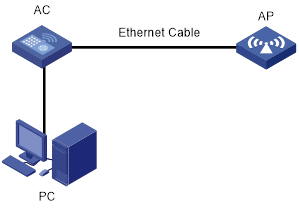
1. Configure AP settings on the AC:
# Create a manual AP named WA7538 and set the AP model to WA7538.
<Sysname> system-view
[Sysname] wlan ap WA7538 model WA7538
# Specify the serial number of the AP.
[Sysname-wlan-ap-WA7538] serial-id 219801A5JR8238E0005Y
[Sysname-wlan-ap-WA7538] quit
2. Configure DHCP on the AC:
# Enable DHCP.
[Sysname] dhcp enable
# Create a DHCP address pool and enter its view.
[Sysname] dhcp server ip-pool dhcp1601
# Assign an IP subnet for the DHCP address pool for dynamic address allocation.
[Sysname-dhcp-pool-dhcp1601] network 160.1.1.0 mask 255.255.255.0
[Sysname-dhcp-pool-dhcp1601] quit
The AP automatically establishes a CAPWAP tunnel with the AC, and then loads the software image from the AC. You can execute the display wlan ap name WA7538 command to verify that the AP is downloading the software image.
<Sysname> display wlan ap all
Total number of aps: 1
Total number of connected aps: 0
Total number of connected configured aps: 0
Total number of connected auto aps: 0
Total number of connected anchor aps: 0
Maximum ap capacity: 512
Remaining ap capacity: 512
Maximum ap license: 0
Remaining ap license: 0
Maximum WTU license: 100
Remaining WTU license: 100
AP information
STAte : I = Idle, J = Join, JA = JoinAck, IL = ImageLoad
C = Config, DC = DataCheck, R = Run, M = Master, B = Backup
AP name AP ID STAte Model Serial ID
--------------------------------------------------------------------------------
WA7538 1 IL WA7538 219801A5JR8238E0005Y
3. Verify that the AP has come online through the AC after software upgrading. (Details not shown.)
4. Verify that the AP firmware has been updated to the most recent version.
H3C Comware Software, Version 7.1.064, ESS 2611P05
Copyright (c) 2004-2024 New H3C Technologies Co., Ltd. All rights reserved.
H3C WA7538 uptime is 0 weeks, 0 days, 0 hours, 0 minutes
Last reboot reason : Power on
Boot image: flash:/wa7500-boot.bin
Boot image version: 7.1.064, ESS 2611P05
Compiled Nov 19 2024 16:00:00
System image: flash:/wa7500-system.bin
System image version: 7.1.064, ESS 2611P05
Compiled Nov 19 2024 16:00:00
Feature image(s) list:
flash:/wa7500-freeradius.bin, version: 7.1.064
Compiled Nov 19 2024 16:00:00
with 1 ARM 2600MHz Processor
2048M bytes DDR4
256M bytes NandFlash Memory
Current running mode: Cloud AP
Next startup mode: Cloud AP
Hardware Version is Ver.B
Basic Bootrom Version is 7.04
Extend Bootrom Version is 7.04
[Subslot 0]H3C WA7538 Hardware Version is Ver.B
[SLOT 1]GE1/0/1 (Hardware)Ver.B, (Driver)1.0
[SLOT 1]XGE1/0/1 (Hardware)Ver.B, (Driver)1.0
[SLOT 1]XGE1/0/2 (Hardware)Ver.B, (Driver)1.0
[SLOT 1]RADIO1/0/1 (Hardware)Ver.B, (Driver)1.0
[SLOT 1]RADIO1/0/2 (Hardware)Ver.B, (Driver)1.0
[SLOT 1]RADIO1/0/3 (Hardware)Ver.B, (Driver)1.0
Upgrading from the Cloudnet
This feature can upgrade only online devices. To upgrade offline devices, download the images to a local directory and upgrade the devices locally. To download images, see Figure 2.
1. On the top navigation bar, click Network.
2. From the left navigation pane, select Maintain > Upgrade.
3. Select the target branch and site from the upper left corner of the work pane.
4. On the Upgrade by Device tab, expand the Filter menu, and filter devices as needed.
5. Select the target devices, and then click Upgrade.
Figure 2 Upgrading specific online devices

6. Select an upgrade method and then click OK.
Figure 3 Selecting the upgrade method
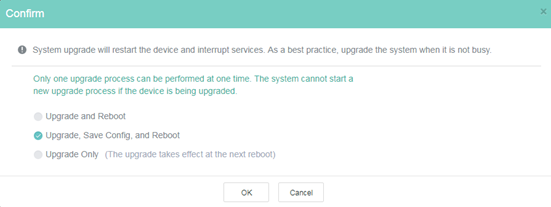
Upgrading devices of specific models
1. On the top navigation bar, click Network.
2. From the left navigation pane, select Maintain > Upgrade.
3. Select the target branch and site from the upper left corner of the work pane.
4. Click the Upgrade by Model tab, expand the Filter menu, and filter devices as needed.
5. To upgrade all devices of specific models, perform the following tasks:
a. Select the target device models, and then click Upgrade.
Figure 4 Upgrading online devices of specific models

b. Select an upgrade method and then click OK.
Figure 5 Selecting an upgrade method
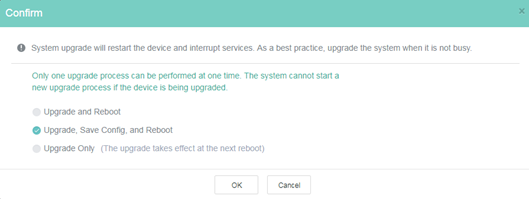
6. To upgrade specific devices of a device model, click the device quantity link for the model. In the window that opens, select the target devices and then click Upgrade.
1. On the top navigation bar, click Network.
2. From the left navigation pane, select Maintain > Upgrade.
3. Select the target branch and site from the upper left corner of the work pane.
4. Click the Upgrade Details tab.
¡ Devices Being Upgraded—Contains current version, progress, and upgrade time information.
¡ Upgraded Devices—Contains current version, upgrade state, and failure reason information.
Upgrading from the Web interface
You can upgrade the software of an AP from the Web interface when the AP operates in cloud AP mode or anchor AC mode.
Set up the upgrade environment as shown in Figure 6 or Figure 7. Make sure the AP and PC can reach each other.
Figure 6 Setting up the upgrade environment (anchor AC mode)

Figure 7 Setting up the upgrade environment (cloud mode)

Upgrading from the Web interface
As a best practice, use the following Web browsers:
· Internet Explorer 10 or higher.
· Firefox 30.0.0.5269 or higher.
· Chrome 35.0.1916.114 or higher.
· Safari 5.1 or higher.
To access the Web interface, you must use the following browser settings:
· Accept the first-party cookies (cookies from the site you are accessing).
· Enable active scripting or JavaScript, depending on the Web browser.
· If you are using a Microsoft Internet Explorer browser, you must enable the following security settings:
¡ Run ActiveX controls and plug-ins.
¡ Script ActiveX controls marked safe for scripting.
· To ensure correct display of webpage contents after software upgrade or downgrade, clear data cached by the browser before you log in.
Logging in to the AP from the Web interface
1. Enter the IP address of the AP in the address bar of the browser.
2. On the login page, enter the username and password. By default, the username and password are admin and h3capadmin, respectively.
Figure 8 Logging in to the AP from the Web interface
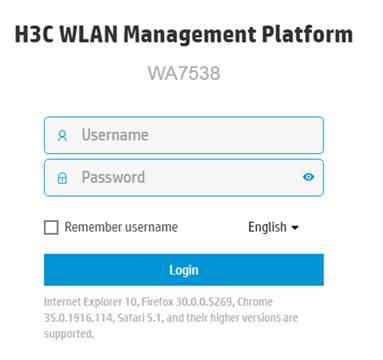
Saving and backing up the configuration file
1. Click the system view tab at the bottom of the page.
2. From the navigation tree, select System > Management.
3. Click the Configuration tab.
4. Click Save Running Configuration.
5. In the dialog box that opens, select to the next-startup configuration file, and then click Apply.
Figure 9 Saving the configuration file
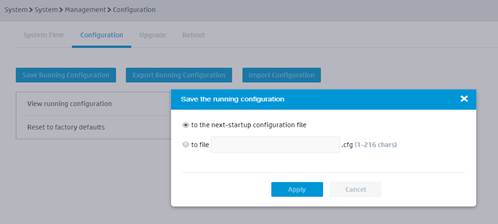
6. On the Configuration tab, click Export Running Configuration to download the configuration file.
Figure 10 Backing up the configuration file
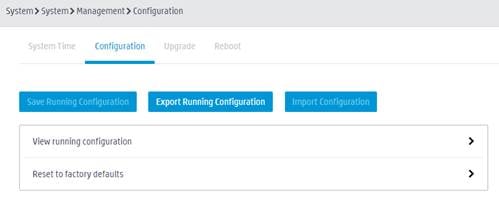
Upgrading the software
1. From the navigation tree, select System > Management.
2. Click the Upgrade tab.
3. Click Upgrade.
4. In the dialog box that opens, select a software image file and select Reboot now.
Figure 11 Selecting software image file
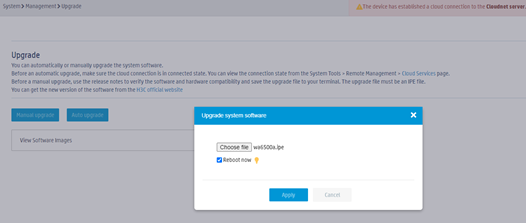
5. Click Apply.
Figure 12 Upgrading software
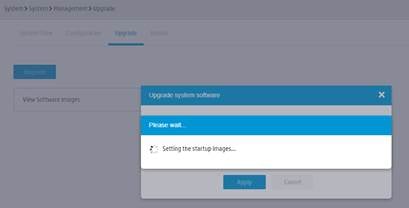
Finishing upgrading the software
1. After the AP restarts, log in to the AP from the Web interface.
2. Click the system view tab at the bottom of the page.
3. From the navigation tree, select System > Management.
4. Click the Configuration tab.
5. Click View running configuration.
6. Verify that the version number is correct.
Figure 13 Finishing upgrading the software version
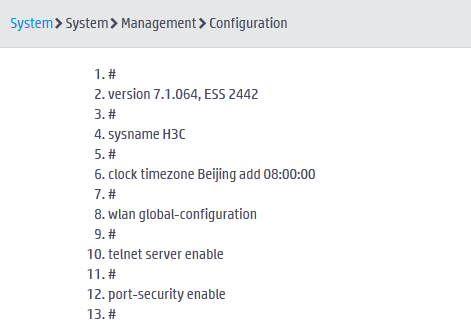
Set up the upgrade environment as shown in Figure 14. Make sure you can log in to the AP through Telnet or the console port.
Figure 14 Setting up the upgrade environment

Saving the running configuration and verifying the storage space
1. Save the running configuration.
<Sysname>save
The current configuration will be written to the device. Are you sure? [Y/N]:y
Please input the file name(*.cfg)[flash:/startup.cfg]
(To leave the existing filename unchanged, press the enter key):
flash:/startup.cfg exists, overwrite? [Y/N]:y
Validating file. Please wait...
Configuration is saved to device successfully.
<Sysname>
2. Display files on the storage medium. Identify the system software image and configuration file names and verify that the flash card has sufficient space for the new system software image.
Directory of flash:
0 drw- - Jan 01 1970 08:00:37 anchor-ac
1 drw- - Mar 26 2021 10:31:49 cloud
2 -rw- 260649 Jan 01 1970 08:00:37 defaultfile.zip
3 drw- - Jan 01 1970 08:00:37 fit
4 -rw- 185 Mar 26 2021 10:31:49 ifindex.dat
5 drw- - Mar 26 2021 07:53:44 pki
6 -rw- 17470 Mar 26 2021 10:31:49 startup.cfg
7 -rw- 219723 Mar 26 2021 10:31:49 startup.mdb
8 -rw- 13936640 Mar 26 2021 07:59:52 wa7500-boot.bin
9 -rw- 46117888 Mar 26 2021 08:00:06 wa7500-system.bin
<Sysname>
Downloading the image file to the AP
You can use the TFTP or FTP commands on the AP to access the TFTP or FTP server to back up or download files.
Using TFTP
Transfer the configuration file to the disk of the AP.
<H3C>tftp 192.168.0.1 get wa7500.ipe
Press CTRL+C to abort.
% Total % Received % Xferd Average Speed Time Time Time Current
Dload Upload Total Spent Left Speed
100 57.2M 100 57.2M 0 0 968k 0 0:00:50 0:00:50 --:--:-- 947k
Writing file...Done.
Using FTP
1. From FTP client view, download the system software image file to the disk of the server.
ftp> get wa7500.ipe
227 Entering Passive Mode (192,168,0,1,208,167).
150 Data connection accepted from 192.168.0.50:1476; transfer starting.
...........................................................................................................
226 Transfer complete.
60061696 bytes received in 10.958 seconds (4.92 Mbytes/s)
ftp> quit
2. Return to user view.
<ftp> quit
221 Service closing control connection
<Sysname>
Specifying the startup image file
1. Specify the wa7500.ipe file as the main image file for the AP at the next reboot.
<Sysname>boot-loader file flash:/wa7500.ipe main
Verifying the file flash:/ wa7500.ipe on the device...Done.
H3C WA7538 images in IPE:
wa7500-boot.bin
wa7500-system.bin
This command will set the main startup software images. Please do not reboot the device during the upgrade. Continue? [Y/N]:y
Add images to the device.
File flash:/wa7500-boot.bin already exists on the device.
File flash:/wa7500-system.bin already exists on the device.
Overwrite the existing files? [Y/N]:y
Decompressing file wa7500-boot.bin to flash:/wa7500-boot.bin.....Done.
Decompressing file wa7500-system.bin to flash:/wa7500-system.bin..............Done.
Verifying the file flash:/wa7500-boot.bin on the device...Done.
Verifying the file flash:/wa7500-system.bin on the device.......Done.
The images that have passed all examinations will be used as the main startup software images at the next reboot on the device.
Decompression completed.
You are recommended to delete the .ipe file after you set startup software images for all slots.
Do you want to delete flash:/wa7500.ipe now? [Y/N]:y
2. Verify that boot.bin and system.bin have been specified as the main startup software images.
<Sysname> display boot-loader
Software images on the device:
Current software images:
Image Version
flash:/wa7500-boot.bin ESS 2605
flash:/wa7500-system.bin ESS 2605
Main startup software images:
Image Version
flash:/wa7500-boot.bin ESS 2605
flash:/wa7500-system.bin ESS 2605
Backup startup software images:
None
<Sysname>
Rebooting the AP to complete the upgrade
1. Reboot the AP.
<Sysname> reboot
Start to check configuration with next startup configuration file, please wait.........DONE!
This command will reboot the device. Continue? [Y/N]:y
Now rebooting, please wait...
<Sysname>
System is starting...
2. After the reboot is complete, verify that the system software image is correct.
<Sysname> display version
H3C Comware Software, Version 7.1.064, ESS 2611P05
Copyright (c) 2004-2024 New H3C Technologies Co., Ltd. All rights reserved.
H3C WA7538 uptime is 0 weeks, 0 days, 0 hours, 0 minutes
Last reboot reason : Power on
Boot image: flash:/wa7500-boot.bin
Boot image version: 7.1.064, ESS 2611P05
Compiled Nov 19 2024 16:00:00
System image: flash:/wa7500-system.bin
System image version: 7.1.064, ESS 2611P05
Compiled Nov 19 2024 16:00:00
Feature image(s) list:
flash:/wa7500-freeradius.bin, version: 7.1.064
Compiled Nov 19 2024 16:00:00
with 1 ARM 2600MHz Processor
2048M bytes DDR4
256M bytes NandFlash Memory
Current running mode: Cloud AP
Next startup mode: Cloud AP
Hardware Version is Ver.B
Basic Bootrom Version is 7.04
Extend Bootrom Version is 7.04
[Subslot 0]H3C WA7538 Hardware Version is Ver.B
[SLOT 1]GE1/0/1 (Hardware)Ver.B, (Driver)1.0
[SLOT 1]XGE1/0/1 (Hardware)Ver.B, (Driver)1.0
[SLOT 1]XGE1/0/2 (Hardware)Ver.B, (Driver)1.0
[SLOT 1]RADIO1/0/1 (Hardware)Ver.B, (Driver)1.0
[SLOT 1]RADIO1/0/2 (Hardware)Ver.B, (Driver)1.0
[SLOT 1]RADIO1/0/3 (Hardware)Ver.B, (Driver)1.0
Upgrading from the BootWare menu
Set up the upgrade environment as shown in Figure 15.
Figure 15 Setting up the upgrade environment

Upgrading from the BootWare menu
1. Enter the EXTENDED-BOOTWARE menu
# Reboot the AP.
System is starting...
Press Ctrl+D to access BASIC-BOOTWARE MENU...
Booting Normal Extended BootWare
The Extended BootWare is self-decompressing....Done.
****************************************************************************
* *
* H3C WA7538 BootWare, Version 7.03 *
* *
****************************************************************************
Copyright (c) 2004-2024 New H3C Technologies Co., Ltd.
Compiled Date : Jan 10 2024
Memory Type : DDR4 SDRAM
Memory Size : 2048MB
Flash Size : 256MB
PCB Version : Ver.A
BootWare Validating...
Press Ctrl+B to access EXTENDED-BOOTWARE MENU...
| NOTE: The output in this section is for illustration only. |
# Press Ctrl+B at the prompt to access the EXTENDED-BOOTWARE menu.
Password recovery capability is enabled.
Note: The current operating device is flash
Enter < Storage Device Operation > to select device.
==========================<EXTENDED-BOOTWARE MENU>==========================
|<1> Boot System |
|<2> Enter Serial SubMenu |
|<3> Enter Ethernet SubMenu |
|<4> File Control |
|<5> Restore to Factory Default Configuration |
|<6> Skip Current System Configuration |
|<7> BootWare Operation Menu |
|<8> Skip Authentication for Console Login |
|<9> Storage Device Operation |
|<0> Reboot |
============================================================================
Ctrl+Z: Access EXTENDED ASSISTANT MENU
Ctrl+F: Format File System
Ctrl+C: Display Copyright
Ctrl+Y: Change AP Mode
Enter your choice(0-9):
Table 5 EXTENDED-BOOTWARE menu options
Item | Description |
<1> Boot System | Boot the system software image. |
<2> Enter Serial SubMenu | Access the Serial submenu for upgrading system software through the console port or changing the serial port settings. |
<3> Enter Ethernet SubMenu | Access the Ethernet submenu for upgrading system software through an Ethernet port or changing Ethernet settings. |
<4> File Control | Access the File Control submenu to retrieve and manage the files stored on the device. |
<5> Restore to Factory Default Configuration | Delete the next-startup configuration files and load the factory-default configuration. |
<6> Skip Current System Configuration | Start the device with the factory default configuration. This is a one-time operation and does not take effect at the next reboot. You use this option when you forget the console login password. |
<7> BootWare Operation Menu | Access the BootWare Operation menu for backing up, restoring, or upgrading BootWare. When you upgrade the system software image, BootWare is automatically upgraded. H3C does not recommend upgrading BootWare separately. This document does not cover using the BootWare Operation menu. |
<8> Skip Authentication for Console Login | Clear all the authentication schemes on the console port. |
<9> Storage Device Operation | Access the Storage Device Operation menu to manage storage devices. Using this option is beyond this chapter. |
<0> Reboot | Restart the device. |
2. In the EXTEND-BOOTWARE menu, enter 3 to access the Ethernet submenu.
==========================<Enter Ethernet SubMenu>==========================
|Note:the operating device is cfa0 |
|<1> Download Image Program To SDRAM And Run |
|<2> Update Main Image File |
|<3> Update Backup Image File |
|<4> Download Files(*.*) |
|<5> Modify Ethernet Parameter |
|<0> Exit To Main Menu |
|<Ensure The Parameter Be Modified Before Downloading!> |
============================================================================
Enter your choice(0-5):
Table 6 Ethernet submenu options
Item | Description |
<1> Download Image Program To SDRAM And Run | Download a system software image to the SDRAM and run the image. |
<2> Update Main Image File | Upgrade the main system software image. |
<3> Update Backup Image File | Upgrade the backup system software image. |
<4> Download Files(*.*) | Download a system software image to the Flash or CF card. |
<5> Modify Ethernet Parameter | Modify network settings. |
<0> Exit To Main Menu | Return to the EXTEND-BOOTWARE menu. |
3. Enter 5 to configure the network settings.
=========================<ETHERNET PARAMETER SET>=========================
|Note: '.' = Clear field. |
| '-' = Go to previous field. |
| Ctrl+D = Quit. |
==========================================================================
Protocol (FTP or TFTP) :ftp
Load File Name :wa7500.ipe
:
Target File Name :wa7500.ipe
:
Server IP Address :192.168.1.1
Local IP Address :192.168.1.100
Subnet Mask :255.255.255.0
Gateway IP Address :0.0.0.0
FTP User Name :user001
FTP User Password :********
Table 7 Network parameter fields and shortcut keys
Field | Description |
'.' = Clear field | Press a dot (.) and then Enter to clear the setting for a field. |
'-' = Go to previous field | Press a hyphen (-) and then Enter to return to the previous field. |
Ctrl+D = Quit | Press Ctrl + D to exit the Ethernet Parameter Set menu. |
Protocol (FTP or TFTP) | Set the file transfer protocol to FTP or TFTP. |
Load File Name | Set the name of the file to be downloaded. |
Target File Name | Set a file name for saving the file on the device. By default, the target file name is the same as the source file name. |
Server IP Address | Set the IP address of the FTP or TFTP server. If a mask must be set, use a colon (:) to separate the mask length from the IP address. For example, 100.1.1.13:24. |
Local IP Address | Set the IP address of the device. |
Subnet Mask | Subnet Mask of the local IP address. |
Gateway IP Address | Set a gateway IP address if the device is on a different network than the server. |
FTP User Name | Set the username for accessing the FTP server. This username must be the same as configured on the FTP server. This field is not available for TFTP. |
FTP User Password | Set the password for accessing the FTP server. This password must be the same as configured on the FTP server. This field is not available for TFTP. |
4. Select the option 2 or 3 in the Ethernet submenu to upgrade a system software image. For example, enter 2 to upgrade the main system software image.
Loading.....................................................................
............................................................................
............................................................................
...................................................Done.
60061696 bytes downloaded!
Image file wa7500-boot.bin is self-decompressing...
Saving file flash:/wa7500-boot.bin .........................................
............................................................................
............................................................................
............................................................................
................................................Done.
Image file wa7500-system.bin is self-decompressing...
Saving file flash:/wa7500-system.bin .......................................
............................................................................
............................................................................
............................................................................
............................................................................
............................................................................
............................................................................
............................................................................
..............Done.
==========================<Enter Ethernet SubMenu>==========================
|Note:the operating device is cfa0 |
|<1> Download Image Program To SDRAM And Run |
|<2> Update Main Image File |
|<3> Update Backup Image File |
|<4> Download Files(*.*) |
|<5> Modify Ethernet Parameter |
|<0> Exit To Main Menu |
|<Ensure The Parameter Be Modified Before Downloading!> |
============================================================================
Enter your choice(0-5):
5. Enter 0 to return to the EXTEND-BOOTWARE menu
Enter your choice(0-5): 0
===========================<EXTENDED-BOOTWARE MENU>==========================
|<1> Boot System |
|<2> Enter Serial SubMenu |
|<3> Enter Ethernet SubMenu |
|<4> File Control |
|<5> Modify BootWare Password |
|<6> Skip Current System Configuration |
|<7> BootWare Operation Menu |
|<8> Skip Authentication for Console Login |
|<9> Storage Device Operation |
|<0> Reboot |
============================================================================
Ctrl+Z: Access EXTENDED ASSISTANT MENU
Ctrl+F: Format File System
Ctrl+C: Display Copyright
Enter your choice(0-9):
6. Enter 1 to boot the system.
Enter your choice(0-9): 1
Loading the main image files...
Loading file cfa0:/wa7500-system.bin...........................
Done.
Loading file cfa0:/wa7500-boot.bin..............Done.
Image file cfa0:/wa7500-boot.bin is self-decompressing.........
.....Done.
System image is starting...
Line con0 is available.
Press ENTER to get started.
7. After the upgrade, verify that the AP's firmware has been upgraded to the most recent version.
<Sysname> display version
H3C Comware Software, Version 7.1.064, ESS 2611P05
Copyright (c) 2004-2024 New H3C Technologies Co., Ltd. All rights reserved.
H3C WA7538 uptime is 0 weeks, 0 days, 0 hours, 0 minutes
Last reboot reason : Power on
Boot image: flash:/wa7500-boot.bin
Boot image version: 7.1.064, ESS 2611P05
Compiled Nov 19 2024 16:00:00
System image: flash:/wa7500-system.bin
System image version: 7.1.064, ESS 2611P05
Compiled Nov 19 2024 16:00:00
Feature image(s) list:
flash:/wa7500-freeradius.bin, version: 7.1.064
Compiled Nov 19 2024 16:00:00
with 1 ARM 2600MHz Processor
2048M bytes DDR4
256M bytes NandFlash Memory
Current running mode: Cloud AP
Next startup mode: Cloud AP
Hardware Version is Ver.B
Basic Bootrom Version is 7.04
Extend Bootrom Version is 7.04
[Subslot 0]H3C WA7538 Hardware Version is Ver.B
[SLOT 1]GE1/0/1 (Hardware)Ver.B, (Driver)1.0
[SLOT 1]XGE1/0/1 (Hardware)Ver.B, (Driver)1.0
[SLOT 1]XGE1/0/2 (Hardware)Ver.B, (Driver)1.0
[SLOT 1]RADIO1/0/1 (Hardware)Ver.B, (Driver)1.0
[SLOT 1]RADIO1/0/2 (Hardware)Ver.B, (Driver)1.0
[SLOT 1]RADIO1/0/3 (Hardware)Ver.B, (Driver)1.0
Using Xmodem to upgrade the BootWare through the console port
Command output information varies by device model.
To use Xmodem to upgrade the BootWare through the console port:
2. Press Ctrl+D immediately after the "Press Ctrl+D to access BASIC-BOOTWARE MENU" message appears.
System is starting...
Press Ctrl+D to access BASIC-BOOTWARE MENU
=====================<BASIC-BOOTWARE MENU (Ver 7.03) >======================
|<1> Modify Serial Interface Parameter |
|<2> Update Extended BootWare |
|<3> Update Full BootWare |
|<4> Boot Extended BootWare |
|<5> Boot Backup Extended BootWare |
|<0> Reboot |
============================================================================
Ctrl+U: Access BASIC ASSISTANT MENU
Ctrl+A: Enter Command Line
Ctrl+C: Display Copyright
Enter your choice(0-5): 1
3. Enter 1 in the BASIC-BOOTWARE menu to access the menu for setting the baud rate of the console port.
===============================<BAUDRATE SET>===============================
|Note:'*'indicates the current baudrate |
| Change The HyperTerminal's Baudrate Accordingly |
|---------------------------<Baudrate Available>---------------------------|
|<1> 9600(Default)* |
|<2> 19200 |
|<3> 38400 |
|<4> 57600 |
|<5> 115200 |
|<0> Exit |
============================================================================
Enter your choice(0-5): 0
4. Select a baud rate.
| IMPORTANT: · If you use a baud rate value other than the default, you must reconnect to the configuration terminal and change its baud rate to be the same as the baud rate selected in the BootWare menu. · Baud rate change is a one-time operation. The baud rate will be restored to the default (9600 bps) at reboot. To set up a console session with the device after a reboot, you must change the baud rate of the configuration terminal back to 9600 bps. |
In this example, enter 0. This option enables you to return to the BASIC-BOOTWARE menu with the default baud rate selected.
=====================<BASIC-BOOTWARE MENU (Ver 7.03) >======================
|<1> Modify Serial Interface Parameter |
|<2> Update Extended BootWare |
|<3> Update Full BootWare |
|<4> Boot Extended BootWare |
|<5> Boot Backup Extended BootWare |
|<0> Reboot |
============================================================================
Ctrl+U: Access BASIC ASSISTANT MENU
Ctrl+A: Enter Command Line
Ctrl+C: Display Copyright
Enter your choice(0-5):
Table 8 BASIC-BOOTWARE menu options
Option | Task |
<1> Modify Serial Interface Parameter | Change the baud rate of the console port. Perform this task before downloading an image through the console port for software upgrade. |
<2> Update Extended BootWare | Upgrade the extended BootWare segment. |
<3> Update Full BootWare | Upgrade the entire BootWare, including the basic segment and the extended segment. |
<4> Boot Extended BootWare | Run the primary extended BootWare segment. |
<5> Boot Backup Extend BootWare | Run the backup extended BootWare segment. |
<0> Reboot | Reboot the device. |
5. Enter 3 in the BASIC-BOOTWARE menu to upgrade the entire BootWare.
Please Start To Transfer File, Press <Ctrl+C> To Exit.
Waiting ...CCCCCCCCCC
6. Open the terminal, select Xmodem in the menu bar, and select the BootWare image version for upgrade.
Xmodem file transfer might be slow depending on the baud rate you selected.
7. After the file transfer is complete, enter Y to upgrade the BootWare.
Starting xmodem transfer. Press Ctrl+C to cancel.
Transferring 34368_v1.06.btw...
100% 644 KB 0 KB/s 00:12:48 0 Errors
Download successfully!
659456 bytes downloaded!
Updating Basic BootWare? [Y/N]Y
Updating Basic BootWare.........Done.
Updating Extended BootWare? [Y/N]Y
Updating Extended BootWare...........Done.
=====================<BASIC-BOOTWARE MENU (Ver 7.03) >======================
|<1> Modify Serial Interface Parameter |
|<2> Update Extended BootWare |
|<3> Update Full BootWare |
|<4> Boot Extended BootWare |
|<5> Boot Backup Extended BootWare |
|<0> Reboot |
============================================================================
Ctrl+U: Access BASIC ASSISTANT MENU
Ctrl+A: Enter Command Line
Ctrl+C: Display Copyright
Enter your choice(0-5): 0
8. Enter 0 in the BASIC-BOOTWARE menu to reboot the device for the new BootWare to take effect. The device displays information about the new BootWare version.
Appendix C Converting the AP mode
This feature is available only for APs of version R2442 or later.
Converting the AP mode from the BootWare menu
1. Set up the configuration environment as shown in Figure 16.
Figure 16 Setting up the configuration environment

2. Reboot the AP. The sample output is shown as follows:
System is starting...
Press Ctrl+D to access BASIC-BOOTWARE MENU...
Booting Normal Extended BootWare
The Extended BootWare is self-decompressing....Done.
****************************************************************************
* *
* H3C WA7538 BootWare, Version 7.03 *
* *
****************************************************************************
Copyright (c) 2004-2024 New H3C Technologies Co., Ltd.
Compiled Date : Jan 10 2024
Memory Type : DDR4 SDRAM
Memory Size : 2048MB
Flash Size : 256MB
PCB Version : Ver.A
BootWare Validating...
Press Ctrl+B to access EXTENDED-BOOTWARE MENU...
3. Press Ctrl+B at the prompt to enter the EXTENDED-BOOTWARE menu.
Password recovery capability is enabled.
Note: The current operating device is flash
Enter < Storage Device Operation > to select device.
==========================<EXTENDED-BOOTWARE MENU>==========================
|<1> Boot System |
|<2> Enter Serial SubMenu |
|<3> Enter Ethernet SubMenu |
|<4> File Control |
|<5> Restore to Factory Default Configuration |
|<6> Skip Current System Configuration |
|<7> BootWare Operation Menu |
|<8> Skip Authentication for Console Login |
|<9> Storage Device Operation |
|<0> Reboot |
============================================================================
Ctrl+Z: Access EXTENDED ASSISTANT MENU
Ctrl+F: Format File System
Ctrl+C: Display Copyright
Ctrl+Y: Change AP Mode
Enter your choice(0-9):
4. Press Ctrl+Y to convert the AP mode.
Please select the new mode
Current mode is Fit
============================================================================
|NO. Mode |
|1 Fit Mode |
|2 Anchor-AC (Virtual AC mode) |
|3 Cloud Mode |
|0 Exit |
============================================================================
Enter your choice(0-3):
5. Enter the mode number.
The mode takes effect immediately without an AP restart.
Converting the AP mode from the Cloudnet
1. Set up the configuration environment as shown in Figure 17, and configure the AP to obtain an IP address through DHCP.
Make sure the following conditions are met:
¡ The AP cannot register on any AC.
¡ The AP can use the IP address assigned by the DHCP server to reach the public network.
¡ The DNS server can translate the address of the Cloudnet correctly.
Figure 17 Setting up the configuration environment
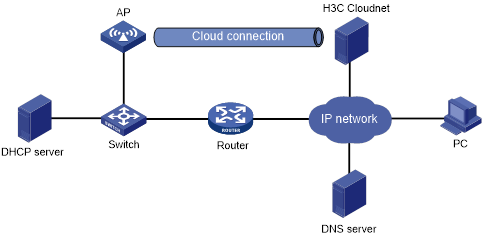
2. Visit oasiscloud.h3c.com through a browser, and then enter the username and password.
3. Add the AP to the Cloudnet.
a. On the top navigation bar, click Network, and then select Network > Devices from the left navigation pane.
b. Select the target branch and site from the upper left corner of the page, and then click Add.
c. Specify the site, device name, and device serial number, and then click Add.
Figure 18 Adding a device
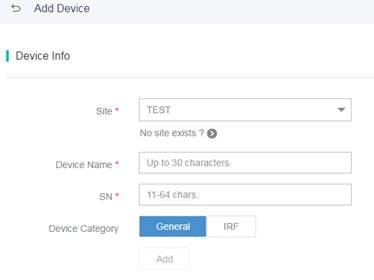
4. Start the AP. If the AP starts up and fails to discover any AC, its operating mode will change to cloud at the first association with the Cloudnet.
5. To manually convert the AP mode, click Network on the top navigation bar, and then select Settings > Cloud APs > Oasis Mode from the left navigation pane. Then, enable the cloud mode (oasis mode in the following figure) for the target AP.
Figure 19 Enabling the cloud mode

Converting the AP mode from the CLI
Access the CLI of the AP and then execute the ap-mode { anchor-ac | cloud | fit } command in system view. Then, the AP restarts for the new mode to take effect and uses the factory defaults or previously saved settings, if any, for the mode.
The CLI does not support entering a question mark (?) to display parameters of this command or using the Tab key to complete the command.

